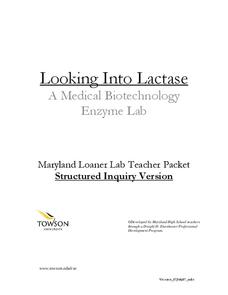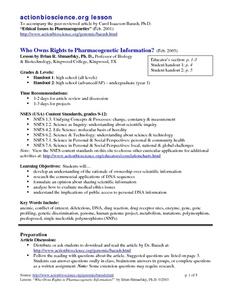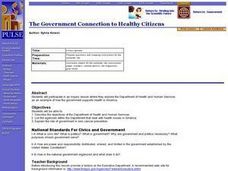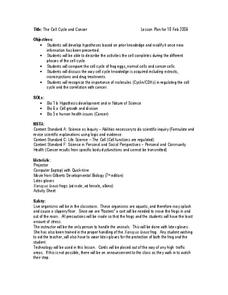Curated OER
Drugged Out Daphnia
Ninth graders participate in experiments to investigate the the effects of nicotine, caffeine, aspirin, alcohol, and sleeping pills on the heart rates of Daphina. They describe the relationships between common drugs and heart rates....
Towson University
Looking Into Lactase: Structured Inquiry
Why is lactase important? Biology scholars explore enzyme function in a structured inquiry lab. The activity tasks lab groups with observing how temperature and pH affect enzyme activity, as well as determining which milk products...
Odell Education
Building Evidence-Based Arguments: “Doping can be that last 2 percent.”
Even the most thrilling sports career can end in an asterisk if the player uses performance-enhancing drugs. Focused on the topic of doping in sports, a seventh grade unit breaks down the arguments for and against steroids in five...
University of Minnesota
Dendritic Spines Lab
This is your brain on drugs ... literally! Your neuroscientists-in-training examine the evidence of drug use on the human brain and how neurons change their connectivity when altered by drugs. They then work together to create testing...
Curated OER
After Ben Johnson: The Dubin Inquiry
Students create interview questions that could be posed to gather necessary information about the use of performance-enhancing drugs. They role-play a mock inquiry using the interview questions.
NOAA
Importance of Deep-Sea Ecosystems – What Killed the Seeds?
Most drugs used today come from nature, so the discovery of new ecosystems in the deep sea is exciting from a medical perspective. Scholars develop their own bioassay to test germination rates in seeds.
University of Minnesota
What's the Deal? Addiction Card Game
Addiction is a big deal! Playing a game of cards helps learners understand the concept of addiction. Through their analysis, they examine the potential for addiction and how it varies for each individual.
Curated OER
TSI: Teen Science Investigations
Students read an article about a research conducted on teen brain decision making. In this health science lesson plan, students identify the steps in the scientific method. They discuss how this research can benefit them when faced with...
Curated OER
The Perils of Drinking Water
Students determine the presence of drugs in water. In this chemistry lesson, students experiment on water samples using thin layer and column chromatography. They determine the concentration of drugs present using graphical analysis.
Curated OER
Non-Compressibility of Water
Students will observe a property of water. For this inquiry-based properties of air lesson, students observe how a change in water pressure impacts the positioning of an eye-dropper in the water container and they make hypotheses about...
Curated OER
Applied Evolution: How Will We Get There from Here?
Students explore the basic process of natural selection and how people can manipulate that process today. The consequences of natural selection on daily life and the implications of evolutionary biology in basic and applied science is...
Curated OER
Yeast Cells and their Environment
Students study the scientific method and explore how to design an experiment. In this investigative lesson students explore and hypothesis an experiment then carry it out to find the results.
National Endowment for the Humanities
Upton Sinclair, Theodore Roosevelt, and Harvey W. Wiley
Though Upton Sinclair's novel The Jungle shocked the American public into a thorough examination of the meat-packing industry, the author was disappointed that his book's main argument—the exploitation of American immigrants—was not part...
Curated OER
Who Owns Rights to Pharmacogenetic Information?
Students develop an understanding of the rationale of ownership over scientific information. They research commercial applications of DNA sequences. They analyze how to evaluate medical ethics issues.
Curated OER
The Cantankerous Pathogen
High schoolers explore what factors influence the spread of infectious diseases. They explain how human manipulation of the environment affects the transmission of diseases.
Curated OER
The Government Connection to Healthy Citizens
High schoolers describe the objectives of the Department of Health and Human Services. They list the agencies within the Department that deal with health issues in America. Students explain the role of government in skin cancer prevention.
Curated OER
Breaking News English: Models Under 16 Banned in London
In this English worksheet, learners read "Models Under 16 Banned in London," and then respond to 1 essay, 47 fill in the blank, 7 short answer, 20 matching, and 8 true or false questions about the selection.
Curated OER
The Cell Cycle and Cancer
Students compare and contrast the cell cycle of frog eggs, normal cells, and cancer cells. They watch a video about early development of the frog embryo, generate a hypothesis in small groups, and listen to a teacher-led lecture. ...
Alabama Learning Exchange
Alex: Touch and Feel: Plant Adaptations
This introductory lesson centers on getting hands-on before getting drug into the vocabulary and nomenclature. In cooperative learning groups students will describe leaves in simple terms. Then, students will use various resources for...




















